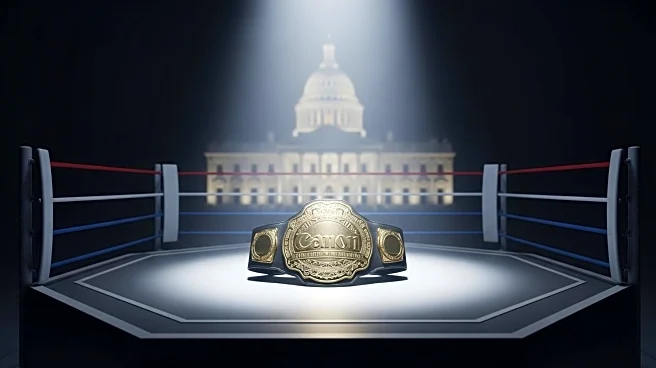What's Happening?
UFC light heavyweight champion Alex Pereira has revealed that he suffered a fractured left foot during his recent title fight against Magomed Ankalaev at UFC 320 in Las Vegas. Pereira reclaimed his championship by knocking out Ankalaev in just 80 seconds, following a previous loss to him in March. Despite the injury, Pereira is focusing on a potential fight at the UFC's White House event scheduled for June 14. Pereira disclosed the injury during a public appearance in Rio de Janeiro, stating that he underwent an X-ray in Las Vegas and an MRI in Brazil, which confirmed the fracture. He expressed interest in participating in the White House event, although he has not set a timeline for his return or identified a specific opponent.
Why It's Important?
Pereira's injury and subsequent focus on the White House event highlight the ongoing challenges faced by athletes in maintaining their competitive edge while dealing with physical setbacks. The potential fight at the White House is significant as it represents a unique venue for UFC events, possibly drawing increased attention and viewership. Pereira's situation also underscores the resilience required in professional sports, as he navigates recovery and strategizes his next moves. The event could impact the UFC's scheduling and promotional efforts, especially if Pereira faces high-profile opponents like Jon Jones, who has expressed interest in returning to the sport.
What's Next?
Pereira's recovery timeline remains uncertain, but he aims to return in time for the White House event. The UFC will likely monitor his progress closely, as his participation could influence the event's lineup and marketing. Potential opponents for Pereira include Jiří Procházka and Carlos Ulberg, or a move to heavyweight to face the winner of the upcoming title fight between Tom Aspinall and Ciryl Gane. The UFC may also consider alternative matchups depending on Pereira's recovery and readiness to compete.
Beyond the Headlines
The prospect of a UFC event at the White House raises questions about the intersection of sports and politics, as such events can serve as platforms for broader cultural and diplomatic engagement. The choice of venue may reflect efforts to elevate the sport's status and appeal to a wider audience, potentially influencing public perception and policy related to sports entertainment.











